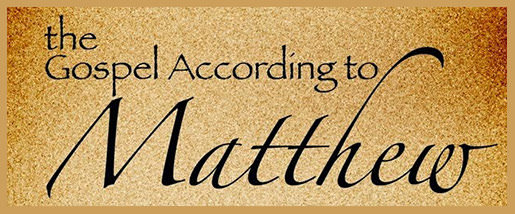1"Be careful not to do your 'acts of righteousness' before men, to be seen by them. If you do, you will have no reward from your Father in heaven.
2"So when you give to the needy, do not announce it with trumpets, as the hypocrites do in the synagogues and on the streets, to be honored by men. I tell you the truth, they have received their reward in full. 3But when you give to the needy, do not let your left hand know what your right hand is doing, 4so that your giving may be in secret. Then your Father, who sees what is done in secret, will reward you."
The Bible gives us four accounts of Jesus’ life and ministry. Each covers many of the same experiences from different perspectives. Some recount moments the others don't. Each was written in a specific context for a specific purpose, affecting how we understand its allusions, references, and framing.
If you haven’t studied Matthew, Mark, Luke, and John closely, you may have trouble recalling what sets each of these books apart.
† Eight noteworthy facts about Matthew’s gospel to remember (compliments of Jesus Film Project)
1. Matthew was primarily written for a Jewish audience.
2. Five women are included in Matthew’s genealogy.
3. The symbol for the Gospel of Matthew is a winged man.
4. The book contains more than 130 Old Testament quotes and allusions.
5. Matthew repeatedly used two phrases no other gospel includes.
6. The book of Matthew is one of the three synoptic gospels.
7. Matthew introduces Jesus as “Messiah.”
8. Matthew is the only gospel that mentions the magi at Jesus’ birth.
- - -
Thanks to BibleProject, we can see and appreciate the mysterious promised deliverer whom Matthew revealed. He, the Messiah, would one day come to confront evil, rescue humanity, and generously give his life lovingly on behalf of many.
An animated video from BibleProject

“Secret Generosity,” Today
Portrayed by Kansas City Santa,
Larry Stewart
This is one of those stories that gets repeated, Christmas after Christmas, never getting old or being forgotten. Every year, this Secret Santa donated used cars and handed out hundreds of $100 bills to random strangers across the country.
Once a homeless stranger himself, Larry Stewart vowed that, if he ever got rich, he'd personally contribute his wealth to those who were struggling financially. He eventually made millions in the cable and long-distance-telephone industries, thereafter becoming the first acclaimed Secret Santa. He chose to reveal his identity after he received a terminal cancer diagnosis in 2006, highlighted below in the two closing videos.
Part 1 of 6
(8 minutes)
† Kansas City's Secret Santa anonymously donates free used cars, hundred-dollar bills, and loving Christmas hugs.
Part 2 of 6
(7.5 minutes)
† His anonymous giving goes back more than twenty-five years!"
Part 3 of 6
(6.5 minutes)
† Over the years, this Secret Santa from Kansas City contributed $1.2 million to people across the country who were in need.
Part 4 of 6
(5 minutes)
† Larry promised God that if God ever put him in a position to help others, he'd gladly and humbly do just that.
Part 5 of 6
(10 minutes)
† Larry thanked so many who'd prayed for him as he struggled with the debilitation of terminal cancer..
Part 6 of 6
(4 minutes)
† Help out someone this Christmas or one day this week. You don’t have to give a $100 bill to make a difference. Simply give your time, your abilities, and possibly some of your money to those in need.
Remember! You don’t live well
until you give well.
‹ ‹ ‹ Return to our Bible-studies Home page.
9As Jesus went on from there, he saw a man named Matthew sitting at the tax collector’s booth. “Follow me,” he told him, and Matthew got up and followed him.
10While Jesus was having dinner at Matthew’s house, many tax collectors and sinners came and ate with him and his disciples. 11When the Pharisees saw this, they asked his disciples, “Why does your teacher eat with tax collectors and sinners?”
12On hearing this, Jesus said, “It is not the healthy who need a doctor, but the sick. 13But go and learn what this means: ‘I desire mercy, not sacrifice.’ For I have not come to call the righteous, but sinners.”
— Matthew 9:9–13 NIV
— Acts 11:19 NIV


